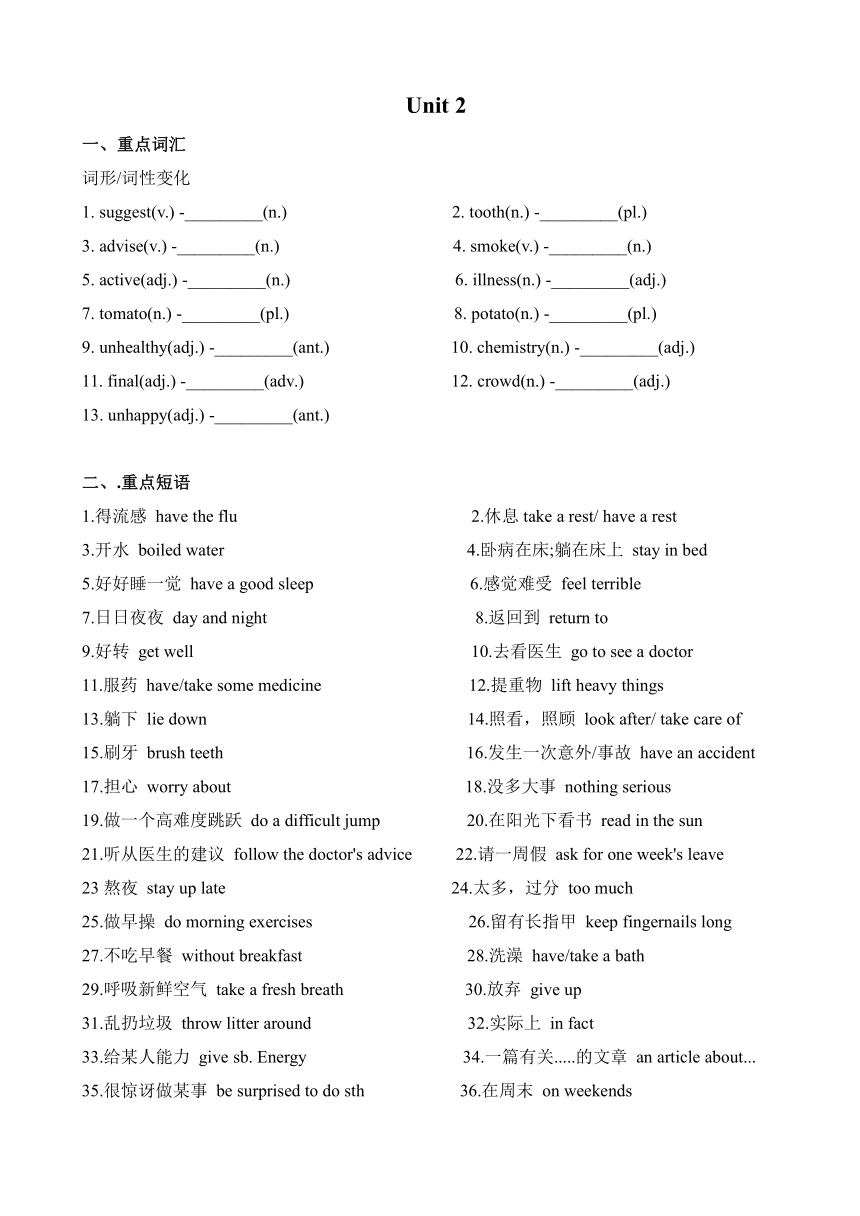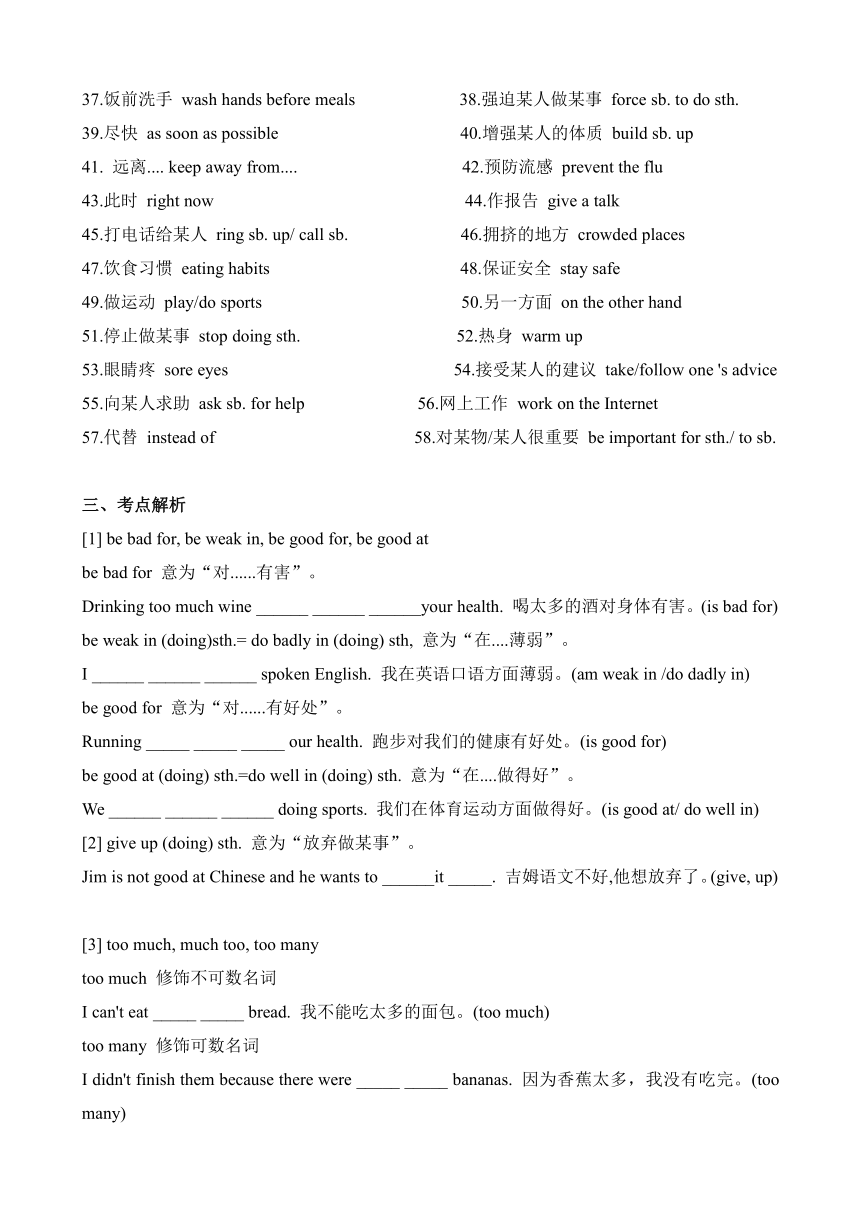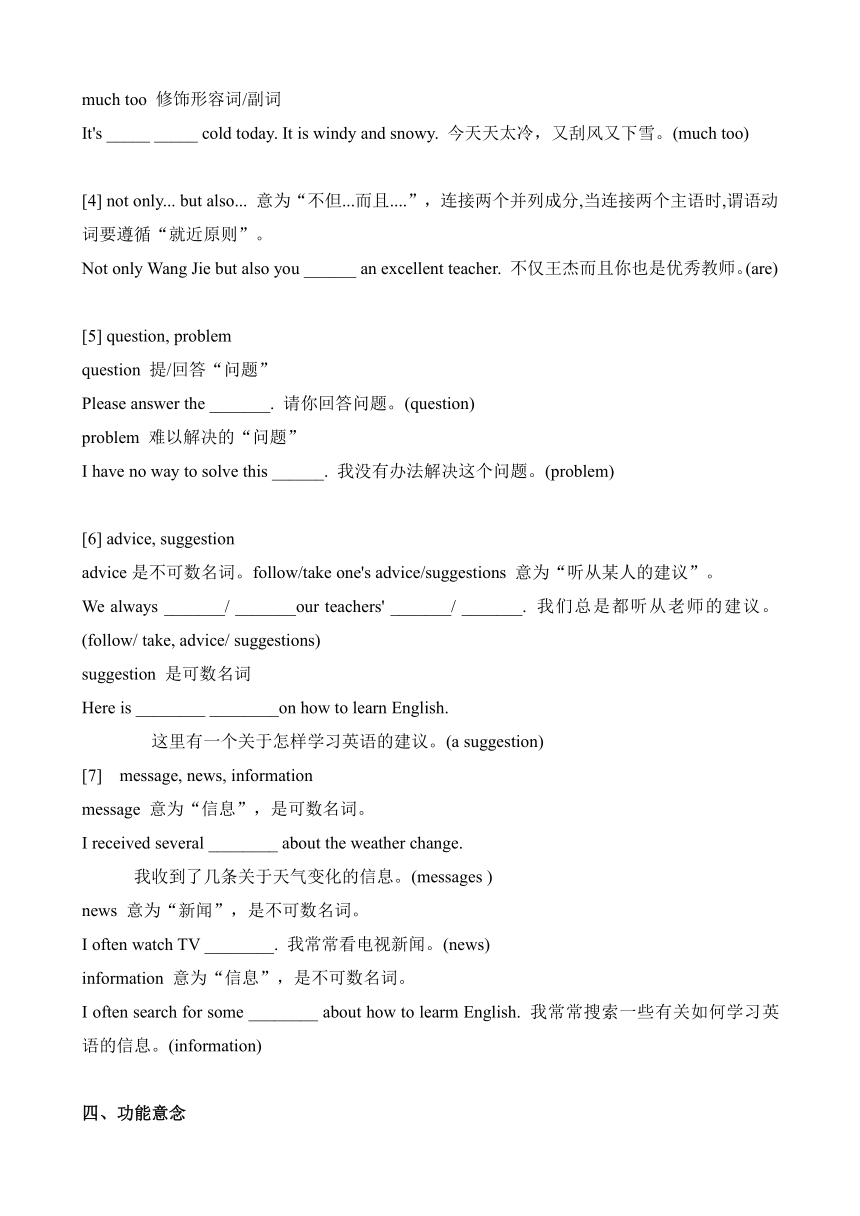Unit 2 Keeping Healthy 基础知识巩固练习 (无答案)
文档属性
| 名称 | Unit 2 Keeping Healthy 基础知识巩固练习 (无答案) |  | |
| 格式 | docx | ||
| 文件大小 | 31.6KB | ||
| 资源类型 | 教案 | ||
| 版本资源 | 仁爱科普版 | ||
| 科目 | 英语 | ||
| 更新时间 | 2023-12-09 11:36:28 | ||
图片预览



文档简介
Unit 2
一、重点词汇
词形/词性变化
1. suggest(v.) -_________(n.) 2. tooth(n.) -_________(pl.)
3. advise(v.) -_________(n.) 4. smoke(v.) -_________(n.)
5. active(adj.) -_________(n.) 6. illness(n.) -_________(adj.)
7. tomato(n.) -_________(pl.) 8. potato(n.) -_________(pl.)
9. unhealthy(adj.) -_________(ant.) 10. chemistry(n.) -_________(adj.)
11. final(adj.) -_________(adv.) 12. crowd(n.) -_________(adj.)
13. unhappy(adj.) -_________(ant.)
二、.重点短语
1.得流感 have the flu 2.休息take a rest/ have a rest
3.开水 boiled water 4.卧病在床;躺在床上 stay in bed
5.好好睡一觉 have a good sleep 6.感觉难受 feel terrible
7.日日夜夜 day and night 8.返回到 return to
9.好转 get well 10.去看医生 go to see a doctor
11.服药 have/take some medicine 12.提重物 lift heavy things
13.躺下 lie down 14.照看,照顾 look after/ take care of
15.刷牙 brush teeth 16.发生一次意外/事故 have an accident
17.担心 worry about 18.没多大事 nothing serious
19.做一个高难度跳跃 do a difficult jump 20.在阳光下看书 read in the sun
21.听从医生的建议 follow the doctor's advice 22.请一周假 ask for one week's leave
23熬夜 stay up late 24.太多,过分 too much
25.做早操 do morning exercises 26.留有长指甲 keep fingernails long
27.不吃早餐 without breakfast 28.洗澡 have/take a bath
29.呼吸新鲜空气 take a fresh breath 30.放弃 give up
31.乱扔垃圾 throw litter around 32.实际上 in fact
33.给某人能力 give sb. Energy 34.一篇有关.....的文章 an article about...
35.很惊讶做某事 be surprised to do sth 36.在周末 on weekends
37.饭前洗手 wash hands before meals 38.强迫某人做某事 force sb. to do sth.
39.尽快 as soon as possible 40.增强某人的体质 build sb. up
41. 远离.... keep away from.... 42.预防流感 prevent the flu
43.此时 right now 44.作报告 give a talk
45.打电话给某人 ring sb. up/ call sb. 46.拥挤的地方 crowded places
47.饮食习惯 eating habits 48.保证安全 stay safe
49.做运动 play/do sports 50.另一方面 on the other hand
51.停止做某事 stop doing sth. 52.热身 warm up
53.眼睛疼 sore eyes 54.接受某人的建议 take/follow one 's advice
55.向某人求助 ask sb. for help 56.网上工作 work on the Internet
57.代替 instead of 58.对某物/某人很重要 be important for sth./ to sb.
三、考点解析
[1] be bad for, be weak in, be good for, be good at
be bad for 意为“对......有害”。
Drinking too much wine ______ ______ ______your health. 喝太多的酒对身体有害。(is bad for)
be weak in (doing)sth.= do badly in (doing) sth, 意为“在....薄弱”。
I ______ ______ ______ spoken English. 我在英语口语方面薄弱。(am weak in /do dadly in)
be good for 意为“对......有好处”。
Running _____ _____ _____ our health. 跑步对我们的健康有好处。(is good for)
be good at (doing) sth.=do well in (doing) sth. 意为“在....做得好”。
We ______ ______ ______ doing sports. 我们在体育运动方面做得好。(is good at/ do well in)
[2] give up (doing) sth. 意为“放弃做某事”。
Jim is not good at Chinese and he wants to ______it _____. 吉姆语文不好,他想放弃了。(give, up)
[3] too much, much too, too many
too much 修饰不可数名词
I can't eat _____ _____ bread. 我不能吃太多的面包。(too much)
too many 修饰可数名词
I didn't finish them because there were _____ _____ bananas. 因为香蕉太多,我没有吃完。(too many)
much too 修饰形容词/副词
It's _____ _____ cold today. It is windy and snowy. 今天天太冷,又刮风又下雪。(much too)
[4] not only... but also... 意为“不但...而且....”,连接两个并列成分,当连接两个主语时,谓语动词要遵循“就近原则”。
Not only Wang Jie but also you ______ an excellent teacher. 不仅王杰而且你也是优秀教师。(are)
[5] question, problem
question 提/回答“问题”
Please answer the _______. 请你回答问题。(question)
problem 难以解决的“问题”
I have no way to solve this ______. 我没有办法解决这个问题。(problem)
[6] advice, suggestion
advice是不可数名词。follow/take one's advice/suggestions 意为“听从某人的建议”。
We always _______/ _______our teachers' _______/ _______. 我们总是都听从老师的建议。(follow/ take, advice/ suggestions)
suggestion 是可数名词
Here is ________ ________on how to learn English.
这里有一个关于怎样学习英语的建议。(a suggestion)
[7] message, news, information
message 意为“信息”,是可数名词。
I received several ________ about the weather change.
我收到了几条关于天气变化的信息。(messages )
news 意为“新闻”,是不可数名词。
I often watch TV ________. 我常常看电视新闻。(news)
information 意为“信息”,是不可数名词。
I often search for some ________ about how to learm English. 我常常搜索一些有关如何学习英语的信息。(information)
四、功能意念
1. 劝告与建议
You should see a dentist. You shouldn't drink coffee or tea in the evening.
You had better lie down and rest. You had better not eat too much candy.
Michael, you need to rest at home for a week.
2. 打电话
Hello! Who's speaking/this -Hello, is Michael in -Speaking.
Hello! May I speak to Tom Hello! I'd like to speak to Mr. Green.
Is that Liu Ying speaking This is Kangkang speaking.
Hello! Extension six two two six, please. Just a moment, please.
Hello! Could/May I speak to Dr. Li Yuping Sorry, he isn't here right now.
OK, I'll ring him up later. I'll call her back again.
Can I leave/take a message Sure, go ahead.
Hold the line, please. Sorry. I can't hear you.
The line is bad/busy. I can't get through.
Sorry, I'm afraid you have the wrong number.
3. 就医
What's the matter with you / What's wrong(with you)
I have a headache/cough/fever.
What seems to be the trouble
I feel terrible.
Do you have a fever
How long have you been like this
It's nothing serious. / You'll be all right/well soon.
Something is wrong with your health.
Take this medicine/the pills twice a day.
I've got a pain here.
It hurts here.
I can't sleep well.
-How are you feeling today
-Not too bad.
Follow the doctor's advice.
五、语法集萃
情态动词
had better的用法
had better= 'd better
had better (not) +do sth. 表示“最好(不要)做某事”,没有人称和数的变化。
就要下雨了。你最好不要外出。It's going to rain. You ____ ____ ____ go out.
should的用法
should (not) +动词原形,表示“(不)应做...”。
你不应该随便扔垃圾。You ______ ______ ______litter around.
must和否定形式
must开头的疑问句,答语用don't have to或needn't表示否定意义,不用must not。
-我必须今晚做完作业吗 -Must I finish my homework tonight
-不,你不必。-No,you _____ _____ _____/______.
must和have to的用法
must表示主观上的必要,have to表示客观需要,have to有人称、数、时态的变化,而must只有一种形式。
为了学好英语,我必须每天学习英语一小时。
In order to learn English well, I ______ study English for one hour every day.
我妹妹病了。我不得不送她去医院。
My sister is ill. I ______ ______ take her to the hospital.
don't have to和mustn't
don't have to意为“不必”,mustn't意为“一定不要, 禁止”。
你一定不要那样对你妈妈说话。You ______ talk to your mother like that.
你不必到人群拥挤的地方去。You ______ ______ ______ go to crowed places.
may的用法
may表示请求允许时,意为“可以”; 表示推测时,意为“可能”。
巩固练习: 用should, shouldn’t, must, mustn’t, needn’t, can’t, may, have to 填空
我可以进来吗 ______ I come in
迈克或许很快就会回来。Mike ______ be back very soon.
1. — I take the message for you right now —No, you needn’t.
2. Do we join the club today
3. Look at the sign. You throw litter around here.
4. — I ask you some questions, Dr. Li —Sure, go ahead.
5. You finish the work tonight. You have enough time to do it.
6. They work out the problem by themselves. It’s too difficult.
7. If you want to be thinner, you eat less meat.
8. You watch too much TV. It’s bad for your eyes.
反身代词
反身代词的形式
反身代词 人称 第一人称 第二人称 第三人称
单数 myself yourself himself / herself /itself
复数 ourselves yourselves themselves
反身代词的用法
“by+反身代词”表示“单独地,独自一人地”。
这个轮船模型是我独自制作的。The model ship was made _____ _____.
反身代词常与动词连用,如:
teach+ 反身代词,意为“自学”;
hurt+ 反身代词,意为“伤害自己”;
help+ 反身代词+to...意为“随便吃....”. ;
enjoy+ 反身代词,意为“.....玩的开心”。
迈克自学汉语。Mike ______ ______Chinese.
珍妮不小心弄伤了自己。Jenny ______ ______by accident.
你随便吃这些香蕉。 ______ ______ ______ these bananas.
我们节日过得很快活。We _____ _____ to the full during the holidays.
巩固练习:用适当的反身代词填空,完成下列句子
1. I told to be careful before the exam.
2. Jack, I believe you can work out this problem by .
3. She said she enjoyed in the park.
4. My brother teaches Japanese every day.
5. Their English teacher was ill. So they learned English by .
6. We can’t finish the work by . We need your help.
7. The little monkey can get the banana from the tree.
一、重点词汇
词形/词性变化
1. suggest(v.) -_________(n.) 2. tooth(n.) -_________(pl.)
3. advise(v.) -_________(n.) 4. smoke(v.) -_________(n.)
5. active(adj.) -_________(n.) 6. illness(n.) -_________(adj.)
7. tomato(n.) -_________(pl.) 8. potato(n.) -_________(pl.)
9. unhealthy(adj.) -_________(ant.) 10. chemistry(n.) -_________(adj.)
11. final(adj.) -_________(adv.) 12. crowd(n.) -_________(adj.)
13. unhappy(adj.) -_________(ant.)
二、.重点短语
1.得流感 have the flu 2.休息take a rest/ have a rest
3.开水 boiled water 4.卧病在床;躺在床上 stay in bed
5.好好睡一觉 have a good sleep 6.感觉难受 feel terrible
7.日日夜夜 day and night 8.返回到 return to
9.好转 get well 10.去看医生 go to see a doctor
11.服药 have/take some medicine 12.提重物 lift heavy things
13.躺下 lie down 14.照看,照顾 look after/ take care of
15.刷牙 brush teeth 16.发生一次意外/事故 have an accident
17.担心 worry about 18.没多大事 nothing serious
19.做一个高难度跳跃 do a difficult jump 20.在阳光下看书 read in the sun
21.听从医生的建议 follow the doctor's advice 22.请一周假 ask for one week's leave
23熬夜 stay up late 24.太多,过分 too much
25.做早操 do morning exercises 26.留有长指甲 keep fingernails long
27.不吃早餐 without breakfast 28.洗澡 have/take a bath
29.呼吸新鲜空气 take a fresh breath 30.放弃 give up
31.乱扔垃圾 throw litter around 32.实际上 in fact
33.给某人能力 give sb. Energy 34.一篇有关.....的文章 an article about...
35.很惊讶做某事 be surprised to do sth 36.在周末 on weekends
37.饭前洗手 wash hands before meals 38.强迫某人做某事 force sb. to do sth.
39.尽快 as soon as possible 40.增强某人的体质 build sb. up
41. 远离.... keep away from.... 42.预防流感 prevent the flu
43.此时 right now 44.作报告 give a talk
45.打电话给某人 ring sb. up/ call sb. 46.拥挤的地方 crowded places
47.饮食习惯 eating habits 48.保证安全 stay safe
49.做运动 play/do sports 50.另一方面 on the other hand
51.停止做某事 stop doing sth. 52.热身 warm up
53.眼睛疼 sore eyes 54.接受某人的建议 take/follow one 's advice
55.向某人求助 ask sb. for help 56.网上工作 work on the Internet
57.代替 instead of 58.对某物/某人很重要 be important for sth./ to sb.
三、考点解析
[1] be bad for, be weak in, be good for, be good at
be bad for 意为“对......有害”。
Drinking too much wine ______ ______ ______your health. 喝太多的酒对身体有害。(is bad for)
be weak in (doing)sth.= do badly in (doing) sth, 意为“在....薄弱”。
I ______ ______ ______ spoken English. 我在英语口语方面薄弱。(am weak in /do dadly in)
be good for 意为“对......有好处”。
Running _____ _____ _____ our health. 跑步对我们的健康有好处。(is good for)
be good at (doing) sth.=do well in (doing) sth. 意为“在....做得好”。
We ______ ______ ______ doing sports. 我们在体育运动方面做得好。(is good at/ do well in)
[2] give up (doing) sth. 意为“放弃做某事”。
Jim is not good at Chinese and he wants to ______it _____. 吉姆语文不好,他想放弃了。(give, up)
[3] too much, much too, too many
too much 修饰不可数名词
I can't eat _____ _____ bread. 我不能吃太多的面包。(too much)
too many 修饰可数名词
I didn't finish them because there were _____ _____ bananas. 因为香蕉太多,我没有吃完。(too many)
much too 修饰形容词/副词
It's _____ _____ cold today. It is windy and snowy. 今天天太冷,又刮风又下雪。(much too)
[4] not only... but also... 意为“不但...而且....”,连接两个并列成分,当连接两个主语时,谓语动词要遵循“就近原则”。
Not only Wang Jie but also you ______ an excellent teacher. 不仅王杰而且你也是优秀教师。(are)
[5] question, problem
question 提/回答“问题”
Please answer the _______. 请你回答问题。(question)
problem 难以解决的“问题”
I have no way to solve this ______. 我没有办法解决这个问题。(problem)
[6] advice, suggestion
advice是不可数名词。follow/take one's advice/suggestions 意为“听从某人的建议”。
We always _______/ _______our teachers' _______/ _______. 我们总是都听从老师的建议。(follow/ take, advice/ suggestions)
suggestion 是可数名词
Here is ________ ________on how to learn English.
这里有一个关于怎样学习英语的建议。(a suggestion)
[7] message, news, information
message 意为“信息”,是可数名词。
I received several ________ about the weather change.
我收到了几条关于天气变化的信息。(messages )
news 意为“新闻”,是不可数名词。
I often watch TV ________. 我常常看电视新闻。(news)
information 意为“信息”,是不可数名词。
I often search for some ________ about how to learm English. 我常常搜索一些有关如何学习英语的信息。(information)
四、功能意念
1. 劝告与建议
You should see a dentist. You shouldn't drink coffee or tea in the evening.
You had better lie down and rest. You had better not eat too much candy.
Michael, you need to rest at home for a week.
2. 打电话
Hello! Who's speaking/this -Hello, is Michael in -Speaking.
Hello! May I speak to Tom Hello! I'd like to speak to Mr. Green.
Is that Liu Ying speaking This is Kangkang speaking.
Hello! Extension six two two six, please. Just a moment, please.
Hello! Could/May I speak to Dr. Li Yuping Sorry, he isn't here right now.
OK, I'll ring him up later. I'll call her back again.
Can I leave/take a message Sure, go ahead.
Hold the line, please. Sorry. I can't hear you.
The line is bad/busy. I can't get through.
Sorry, I'm afraid you have the wrong number.
3. 就医
What's the matter with you / What's wrong(with you)
I have a headache/cough/fever.
What seems to be the trouble
I feel terrible.
Do you have a fever
How long have you been like this
It's nothing serious. / You'll be all right/well soon.
Something is wrong with your health.
Take this medicine/the pills twice a day.
I've got a pain here.
It hurts here.
I can't sleep well.
-How are you feeling today
-Not too bad.
Follow the doctor's advice.
五、语法集萃
情态动词
had better的用法
had better= 'd better
had better (not) +do sth. 表示“最好(不要)做某事”,没有人称和数的变化。
就要下雨了。你最好不要外出。It's going to rain. You ____ ____ ____ go out.
should的用法
should (not) +动词原形,表示“(不)应做...”。
你不应该随便扔垃圾。You ______ ______ ______litter around.
must和否定形式
must开头的疑问句,答语用don't have to或needn't表示否定意义,不用must not。
-我必须今晚做完作业吗 -Must I finish my homework tonight
-不,你不必。-No,you _____ _____ _____/______.
must和have to的用法
must表示主观上的必要,have to表示客观需要,have to有人称、数、时态的变化,而must只有一种形式。
为了学好英语,我必须每天学习英语一小时。
In order to learn English well, I ______ study English for one hour every day.
我妹妹病了。我不得不送她去医院。
My sister is ill. I ______ ______ take her to the hospital.
don't have to和mustn't
don't have to意为“不必”,mustn't意为“一定不要, 禁止”。
你一定不要那样对你妈妈说话。You ______ talk to your mother like that.
你不必到人群拥挤的地方去。You ______ ______ ______ go to crowed places.
may的用法
may表示请求允许时,意为“可以”; 表示推测时,意为“可能”。
巩固练习: 用should, shouldn’t, must, mustn’t, needn’t, can’t, may, have to 填空
我可以进来吗 ______ I come in
迈克或许很快就会回来。Mike ______ be back very soon.
1. — I take the message for you right now —No, you needn’t.
2. Do we join the club today
3. Look at the sign. You throw litter around here.
4. — I ask you some questions, Dr. Li —Sure, go ahead.
5. You finish the work tonight. You have enough time to do it.
6. They work out the problem by themselves. It’s too difficult.
7. If you want to be thinner, you eat less meat.
8. You watch too much TV. It’s bad for your eyes.
反身代词
反身代词的形式
反身代词 人称 第一人称 第二人称 第三人称
单数 myself yourself himself / herself /itself
复数 ourselves yourselves themselves
反身代词的用法
“by+反身代词”表示“单独地,独自一人地”。
这个轮船模型是我独自制作的。The model ship was made _____ _____.
反身代词常与动词连用,如:
teach+ 反身代词,意为“自学”;
hurt+ 反身代词,意为“伤害自己”;
help+ 反身代词+to...意为“随便吃....”. ;
enjoy+ 反身代词,意为“.....玩的开心”。
迈克自学汉语。Mike ______ ______Chinese.
珍妮不小心弄伤了自己。Jenny ______ ______by accident.
你随便吃这些香蕉。 ______ ______ ______ these bananas.
我们节日过得很快活。We _____ _____ to the full during the holidays.
巩固练习:用适当的反身代词填空,完成下列句子
1. I told to be careful before the exam.
2. Jack, I believe you can work out this problem by .
3. She said she enjoyed in the park.
4. My brother teaches Japanese every day.
5. Their English teacher was ill. So they learned English by .
6. We can’t finish the work by . We need your help.
7. The little monkey can get the banana from the tree.
同课章节目录
- Unit 1 Playing Sports
- Topic 1 I'm going to play basketball.
- Topic 2 I'll kick you the ball again.
- Topic 3 The school sports meet is coming.
- Unit 2 Keeping Healthy
- Topic 1 You should brush your teeth twice a day.
- Topic 2 I must ask him to give up smoking.
- Topic 3 Must we exercise to prevent the flu?
- Unit 3 Our Hobbies
- Topic 1 What's your hobby?
- Topic 2 What sweet music!
- Topic 3 What were you doing at this time yesterday
- Unit 4 Our World
- Topic 1 What's the strongest animal on the farm?
- Topic 2 How can we protect ourselves from the eart
- Topic 3 The Internet makes the world smaller.
